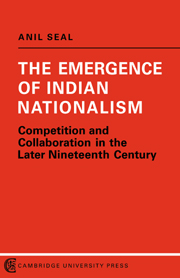Book contents
- Frontmatter
- Contents
- List of Maps and Tables
- Preface
- Abbreviations
- India: British Provinces and Native States
- 1 Political India
- 2 The Political Arithmetic of the Presidencies
- 3 The Rewards of Education
- 4 The Policies of the Rulers
- 5 The Politics of the Associations
- 6 The Politics of Union
- 7 The Muslim Breakaway
- 8 Perspectives
- Appendices
- Glossary
- Biographical Notes
- Bibliography
- Index
4 - The Policies of the Rulers
Published online by Cambridge University Press: 23 November 2009
- Frontmatter
- Contents
- List of Maps and Tables
- Preface
- Abbreviations
- India: British Provinces and Native States
- 1 Political India
- 2 The Political Arithmetic of the Presidencies
- 3 The Rewards of Education
- 4 The Policies of the Rulers
- 5 The Politics of the Associations
- 6 The Politics of Union
- 7 The Muslim Breakaway
- 8 Perspectives
- Appendices
- Glossary
- Biographical Notes
- Bibliography
- Index
Summary
The notions and policies of the British remain of crucial importance at this time, because Indian attitudes were still reactions to official measures rather than independent initiatives. Indeed, only the government of India was in any position to take a comprehensive view of Indian affairs, because the only unity of India lay in the supremacy of that government over the British provinces and native states alike. The apex of this system of government was the Governor-General and Viceroy. Accordingly, however much it might please the Old India Hands to dismiss him as the Great Ornamental, it was the policies enunciated by him or in his name which reflected the official attitudes towards educated Indians all over India. It was this that brought these Indians together and determined whether they would unite in favour of the Raj or not. Lytton was the first Viceroy to be urgently confronted with this problem; his solutions were reversed by Ripon; Dufferin took a middle course. Yet all three were trying to protect the Raj against the onslaught of change.
When Lytton arrived in 1876, he was soon complaining that ‘Northbrook really settled nothing of importance, and has bequeathed to me all the biggest questions of Indian Government, greatly embarrassed by the previous systematic evasion of their accumulating difficulties.’ He was by no means the only Viceroy to lament the policy of the man he replaced; but in this case the difference in aims and methods was striking. Northbrook was one of the Whig Barings with no great fondness for state action.
- Type
- Chapter
- Information
- The Emergence of Indian NationalismCompetition and Collaboration in the Later Nineteenth Century, pp. 131 - 193Publisher: Cambridge University PressPrint publication year: 1968
- 1
- Cited by

